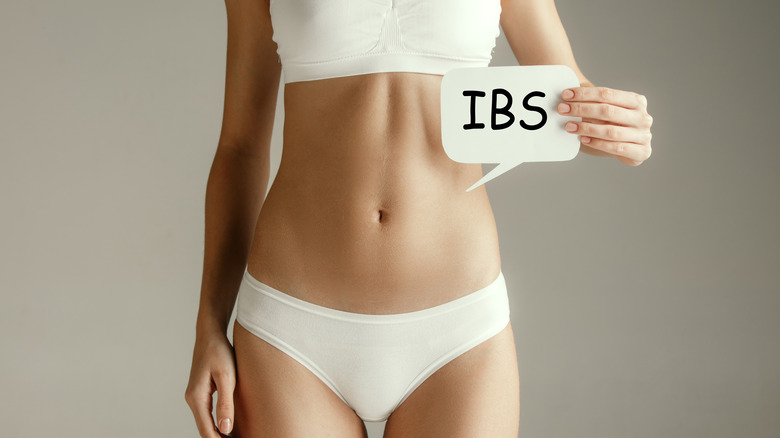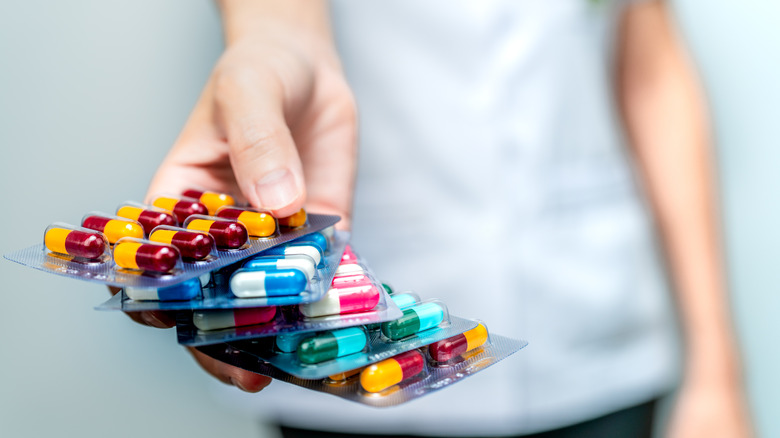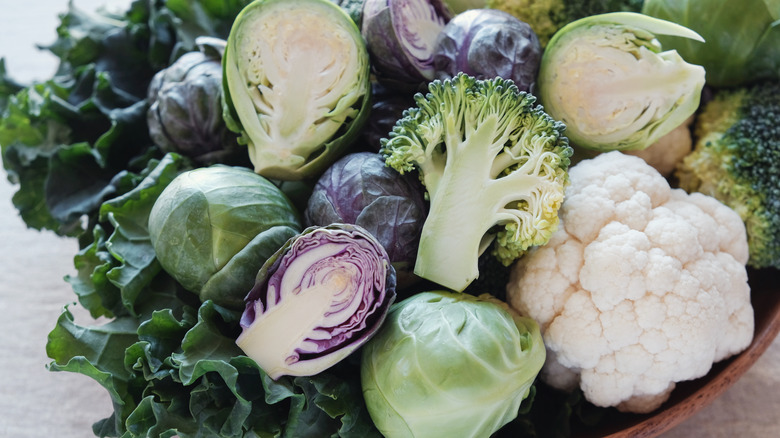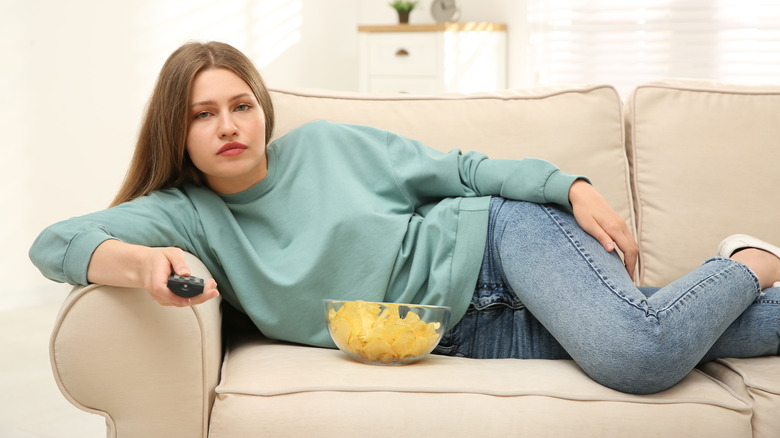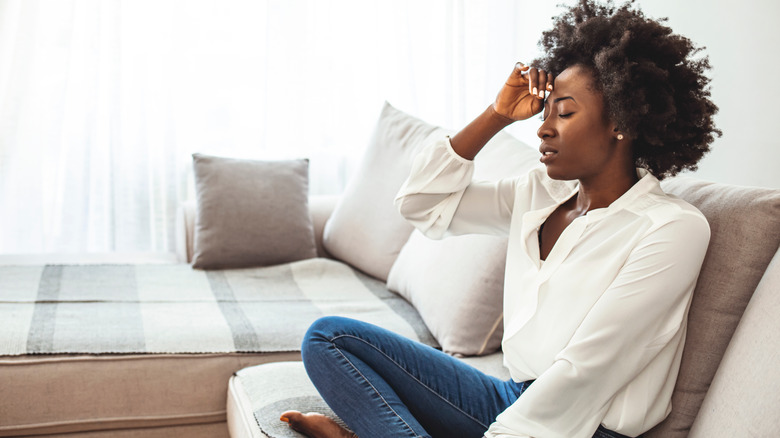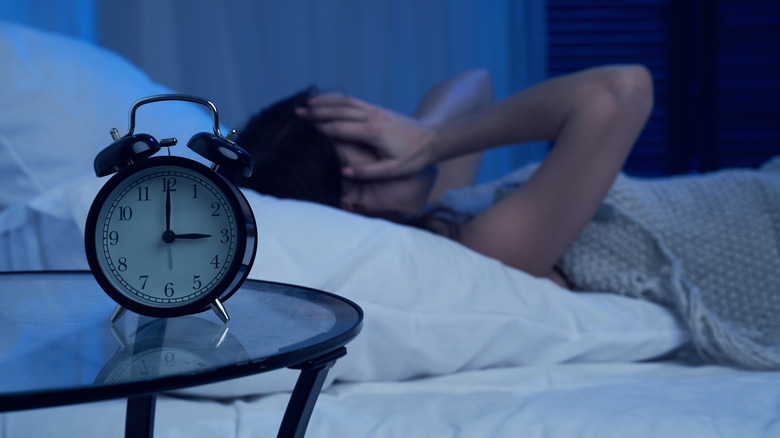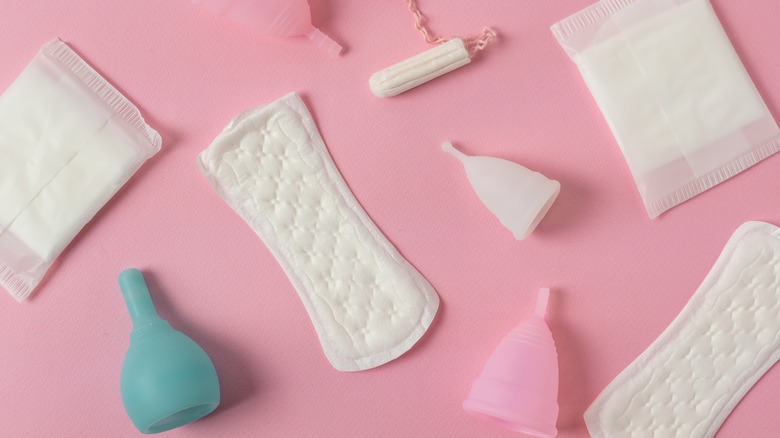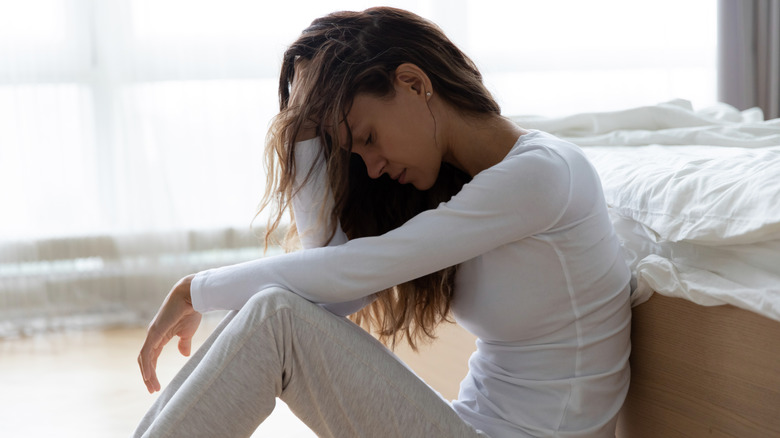12 Surprising Things That Could Be Making Your IBS Worse
There once was a time when people didn't talk about gut health or bathroom habits. It was kind of a taboo subject. Nowadays, however, gut health is a common topic, and so are the chronic conditions related to it, like Irritable Bowel Syndrome (IBS).
IBS is a pretty common condition. In fact, according to the International Foundation for Functional Gastrointestinal Disorders, about 5% to 10% of the global population are affected by the condition. IBS is not a life-threatening disease and doesn't cause any other diseases like cancer, but it can be a literal pain in the butt, so to speak, especially because doctors still have very little knowledge about what causes it.
According to the NHS, IBS usually manifests as diarrhea, constipation, bloating, and stomach pain or cramps. WebMD explains that IBS is divided into three categories: IBS with constipation (IBS-C), IBS with diarrhea (IBS-D), and IBS mixed (IBS-M), where patients experience both diarrhea and constipation. Studies in the World Journal of Gastroenterology have found that women are more likely to develop IBS than men (Why is that not surprising?). And your hormones might be one of the culprits, though more research needs to be done. Luckily, there are things you can do to help alleviate symptoms if you have IBS. Here's a look at 12 surprising things that can make your IBS worse, and how to turn it around so you can keep your symptoms under control.
Drinking too much caffeine
Most of us can't imagine giving up coffee. Ever. These magic beans help start your day off on the right foot — but for some people suffering from IBS, this popular hot drink might have the exact opposite effect, and you might find yourself starting the day off with a lengthy bathroom session. But why is that?
First things first: If you suffer from IBS-D, coffee is more likely to make you run to the bathroom. Gastroenterologist Niket Sonpal told Well+Good that caffeine acts as a stimulant to the gut and increases what is known as gut motility. Those suffering from IBS-D already have higher gut motility than others, so drinking coffee is simply adding fuel to an already raging fire. Registered dietician-nutritionist Kate Scarlata explains that your body releases gastrin and cholecystokinin when you drink coffee. These are the two hormones responsible for kickstarting your body's digestive process, so it's no wonder coffee aggravates IBS-D.
Taking medication that cause constipation
How often do you check the possible side effects of the medication you're taking? If you have IBS, you better start reading that pamphlet. Studies in the National Library of Medicine have shown that taking prescribed medication like antibiotics can negatively affect your gut's bacteria. Those suffering from IBS could find that their symptoms worsen with the use of these drugs. In an article Dr. Charles Patrick Davis wrote for MedicineNet, he explains that the risk of experiencing side effects from antibiotics increases when you use them for extended periods.
Sometimes, IBS is treated with anti-depressants when doctors have tried various treatments without success. Unfortunately, these medications can cause the very symptoms you're trying to get rid of, like diarrhea and constipation. Davis explains that you should especially watch out for tricyclic antidepressants. He also warns against medications that include sorbitol in their list of ingredients (cough syrups are especially guilty of this), as well as over-the-counter medications prescribed for pain, like Advil.
Another pro tip from Davis is to always check both the active and inactive ingredients since components like sorbitol are sometimes hiding among the inactive ingredients. You might be wondering how you're supposed to treat pain if something as common as Advil can set off your symptoms, but luckily there are other medications that can help without causing your IBS to flare up. Gastroenterologist Kimberly Tosch at Henry Ford Health suggests that IBS patients take Tylenol if they experience any pain that needs treatment.
Big meals instead of small, frequent ones
Our daily lives tend to be rushed, and so are our meals. Some of us barely have time to grab breakfast, while others don't have time for lunch. This often results in eating big meals when you finally have the chance to grab a bite, or you end up eating on-the-go. Both of these habits can trigger IBS symptoms.
According to the International Foundation for Functional Gastrointestinal Disorders (IFFGD), IBS patients often associate certain foods with specific symptoms, but for some, the type of food might not be the problem at all — it's the way you consume it.
You guessed it: Munching on a sandwich while wading through your overflowing inbox or taking phone calls from clients is not the way to go about it — you need to eat slowly and mindfully without stressful distractions.
According to Verywell Health, your digestive tract will also be much happier if you don't overload it with big meals three times a day. Instead, focus on eating regular, small meals. IFFGD suggests opting for around five to six small meals a day, while also avoiding foods that are high in fat since it's known for overstimulating the gut. Medical News Today also suggests that you establish a routine when it comes to sitting down to eat — try to work out a set schedule, and don't skip any meals if you can help it.
Eating too many cruciferous vegetables
Vegetables can't possibly be bad for you, right? As it turns out, strange things can cause symptoms when you have IBS, and that includes some vegetables. Is it crazy that your gut can get itself into a twist over certain veggies? Yes, but luckily it's only a few specific greens you need to watch out for — and these are known as cruciferous vegetables. This includes cabbage and all vegetables related to it, like broccoli, kale, and brussels sprouts.
Cruciferous vegetables are incredibly healthy but contain sugars that can cause gassiness, according to WebMD. They are also incredibly rich in fiber, which is a good thing, but unfortunately for IBS sufferers, the high insoluble fiber content can be hard for their bodies to digest, resulting in discomfort. These vegetables pack a punch when it comes to your overall health, however. According to WebMD, cruciferous vegetables could potentially lower your cancer risk. So what are you supposed to do if they trigger your IBS symptoms? That's simple: Cook them. Cooking these kinds of vegetables will make the digestion process easier, resulting in less discomfort.
You're eating common trigger foods
When you have IBS, it might seem like literally every single type of food on the planet sets off your symptoms. Before you start living off water and rice cakes, however, eat less of the foods commonly known to trigger IBS symptoms.
According to a study published in the National Library of Medicine, IBS patients commonly link specific foods to their symptoms — up to 70%, in fact. The study found that avoiding common trigger foods can help ease symptoms, the first of which are foods high in fat and fructose. Nutritionist for Senocalm, Fiona Hunter, told Cosmopolitan that the reason high-fat foods trigger symptoms is because of their ability to negatively affect gut motility, slowing down the process to the extent where your body can't properly expel built-up gas. And that causes stomach pain and bloating.
Another study found that the reason foods high in fructose (apples, for instance) should be avoided, is because many people with IBS cannot absorb this sugar properly. It makes its way to your gut where it starts to ferment in the colon. That's when IBS patients start experiencing symptoms like bloating, gas, and diarrhea. Wheat and dairy products are also common culprits, as well as onions and beans.
Avoiding exercise
Exercise is a great way to keep your body healthy, and it may also help you get a handle on those pesky IBS symptoms. If you spend most of the day seated in front of your computer and don't engage in any type of exercise, you may be making your symptoms worse. Gastroenterologist Gina Sam told Livestrong that spending most of the day seated at your desk causes the whole digestion process to slow down, which is why you might feel bloated after a long day at work. The International Foundation for Gastrointestinal Disorders recommends that those who spend their days seated ensure that they get up and move around frequently — this will help to ease symptoms like bloating.
A study published in the American Journal of Gastroenterology proved that exercise can help alleviate IBS symptoms. It found that those who engage in regular exercise have less severe symptoms than those who don't engage in any physical activity. The study suggests that exercise be incorporated as one of the treatment methods for IBS. If you're ready to kick the couch-potato lifestyle, you'll be happy to know that you're not required to do a hundred burpees to reap the benefits. The Neurogastroenterology and Motility journal published a review that was done of previous studies looking at the impact exercise has on IBS symptoms. Exercises like yoga, walking, and tai chi all had a positive impact.
Nice and easy does it.
Exercise that's too intense
If you already have an exercise routine but find that it doesn't improve your IBS symptoms, you might be doing the wrong type of exercise.
Gina Sam further told Livestrong that some types of exercise can exacerbate existing IBS symptoms, and if you're in the middle of a flare-up, you should especially avoid exercise that puts a lot of stress on your body. This includes workouts that fall into the high-intensity category. High-intensity interval training (HIIT) is a very popular workout style that is loved by many, but it's not so great for those who have IBS. Because it's so intense, your body experiences added stress while you're exercising and react by releasing cortisol. If you have IBS-D, you might find that this type of exercise makes it significantly worse.
Registered dietician-nutritionist Emily Van Eck suggests you do exercises that pack less of a punch. If you're worried that you'll burn fewer calories, you should know that's actually a good thing — Van Eck warns that being in too big a deficit can undermine digestion, resulting in even more discomfort. A recent study supports Van Eck's former statement. It found that doing lengthy, high-intensity workouts can seriously mess with your gut, putting you at a higher risk of gut damage and impaired gut function, even if you don't have IBS — although having the condition puts you at a higher risk. Low-impact and moderate intensity is where the magic's at — your gut will thank you for it.
Not managing stress levels
Stress can make your IBS symptoms significantly worse. In fact, according to a study published in the World Journal of Gastroenterology, stress could actually be one of the things that cause IBS to develop. Yikes!
Whether you suffer from anxiety and depression or find yourself stressing a lot, your gut reacts to it. This is because these conditions directly affect your brain. Your brain reacts by releasing chemicals that activate your gut's pain signals, which, in turn, has a direct impact on the colon, according to WebMD. According to the aforementioned study, there is a direct link between your brain and your gut. Stress impacts your gut and vice versa. This is because of what is called the gut-brain axis and microbiota-gut-brain axis. When you experience a stressful emotion or situation, this connection between the gut and brain is what causes your IBS symptoms to increase in severity. The best way to handle it is to learn how to deal with stressful situations so it doesn't have such a big impact on your gut.
WebMD suggests you ease stress by spending time on something you love to do, like various forms of exercise. You can also reduce stress by setting aside time to spend on hobbies — whatever that looks like for you. Professor of psychology at the State University of New York at Albany, Edward Blanchard, says that talk therapy can also be greatly beneficial to helping IBS patients deal with stress.
Neglecting sleep
IBS can make you feel like you don't have control over your body, so it's best to focus on the things you can control, like how much you sleep. Most of us don't get enough Zzzs, and according to a study, people who have IBS are more likely to experience difficulty having a good night's rest, which in turn makes symptoms worse. A study in the Journal of Clinical Medicine looked at how sleep affects IBS in women and found that missing out on quality sleep can lead to more severe symptoms the following day, along with the usual consequences such as feeling groggy and irritable. There is one bright point, though: If you have a very bad IBS flare during the day, it will not directly affect whether or not you will be able to have a good night's sleep.
More studies need to be done on the subject. Kyle D. Staller, gastroenterologist and Harvard Medical School instructor, told Health that doctors still don't know for sure whether gut issues affect sleep quality or if sleep quality is the culprit behind gut issues. He suggests IBS patients don't view sleep as something that will most definitely worsen or improve symptoms. Instead, he recommends seeing it as a tool that can help tone down the severity of symptoms. He suggests you create a nighttime routine for yourself and stick to it. You should also try not to leave on any unnecessary screens or lights when you go to bed.
You're on your period
You might have realized that once a month, your IBS symptoms tend to be more intense. That's because your menstrual cycle has a direct impact on your gut.
A study published in the World Journal of Gastroenterology showed that women are more predisposed to developing IBS, and their hormones might be the reason why. During your period, there are two hormones at work: progesterone and estrogen. Your body has receptor cells specifically for these hormones, and guess where they are located? In your gut! It's no wonder, then, that IBS symptoms flare up when that time of the month arrives.
A study found that a significant number of women experience gastrointestinal changes when they're on their period — and not just those who have IBS. The changes the hormones bring about in your gut usually affect bowel movements. IBS patients typically find that their usual symptoms (stomach pain, diarrhea, and bloating) intensify.
You may also experience different symptoms depending on the phase of your menstrual cycle. A study published in BMC Women's Health found that women can expect IBS symptoms to intensify before menstruation begins or for the first couple of days after it started. The most common symptoms are usually diarrhea, stomach pain, and nausea.
Not actively tracking the patterns of your IBS symptoms
IBS is different for everyone, that's why IBS patients are usually encouraged to track their symptoms. Nutritionist Fiona Hunter told Cosmopolitan that people have different reactions to specific types of food. A full-proof eating plan or diet for IBS doesn't exist, and while that may suck, tracking your food and symptoms could be very helpful in determining what causes symptoms for you specifically.
An article written by Arnold Wald, MD, supports this, explaining that it's crucial for patients to track their symptoms and bowel movements as well as other factors they suspect might have an impact on their IBS. This way, you can figure out what the root cause of your flare-ups is. The International Foundation for Functional Gastrointestinal Disorders suggests you keep a diary of your symptoms for two to four weeks to see a comprehensive picture of how your body reacts to your everyday habits like the food you eat, stress, sleep, and exercise. This data can also help your doctor to treat your IBS accordingly.
A study published in the World Journal of Gastroenterology looked at how effective a health-monitoring app can be at helping people track and understand their IBS symptoms. The results were fairly positive and doctors suspect that it's because, with the help of the app, patients could start to see the patterns that caused their symptoms to flare up and take steps to eliminate or avoid those factors.
Cutting trigger foods without consulting a professional
It's fairly easy to start seeing food as the enemy when you suffer from IBS, and you might be tempted to cut out foods you suspect are causing trouble and simply stick to "safe" foods. However, unless you're a nutritionist, this is not the right or safe thing to do.
In an article registered dietitian nutritionist Esther Ellis wrote for the Academy of Nutrition and Dietetics, she strongly advises that IBS patients seek help from registered dietician nutritionists (RDNs). They are professionals who specialize in creating customized eating plans for people suffering from conditions like IBS. These experts can be incredibly helpful when it comes to figuring out which foods don't agree with your gut and can suggest healthy alternatives to ensure your gut stays happy.
According to WebMD, you can typically expect an RDN to start treatment by slowly incorporating more fiber-rich foods into your diet plan. They will also ensure that the diet you follow is healthy and safe.
When it comes to choosing a RDN to work with, Verywell Health suggests you have a few questions ready when you first contact them. Ask if they've worked with IBS patients before and if they have previously created low-FODMAP (fermentable oligosaccharides, disaccharides, monosaccharides, and polyols) diets for clients. This diet has helped to improve IBS symptoms for some patients, and it's best to work with a RDN that has experience with it.
